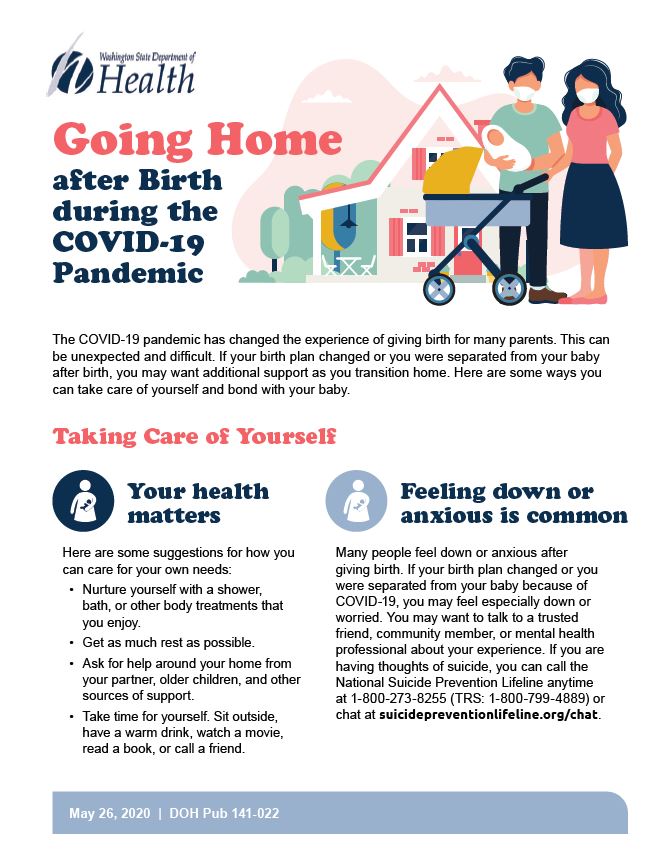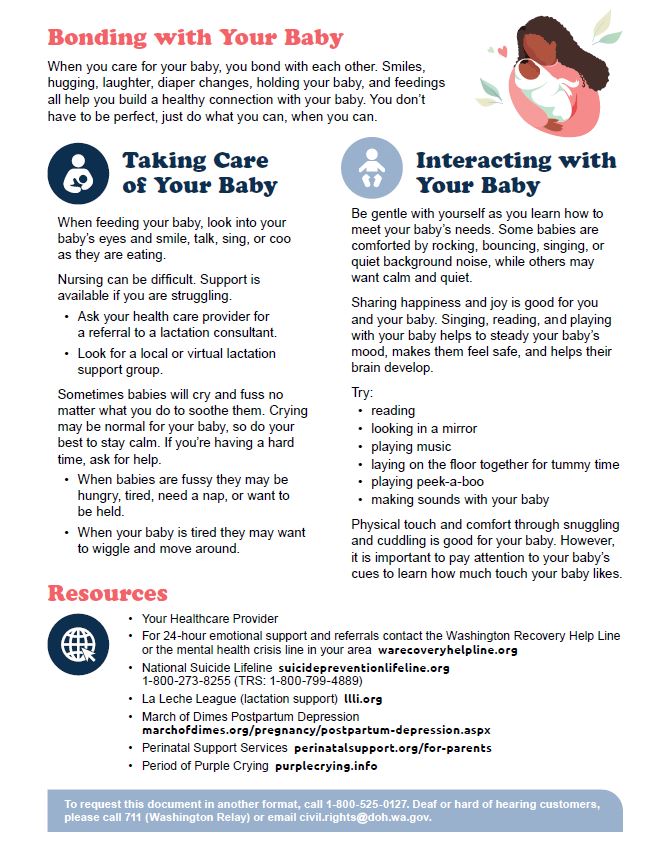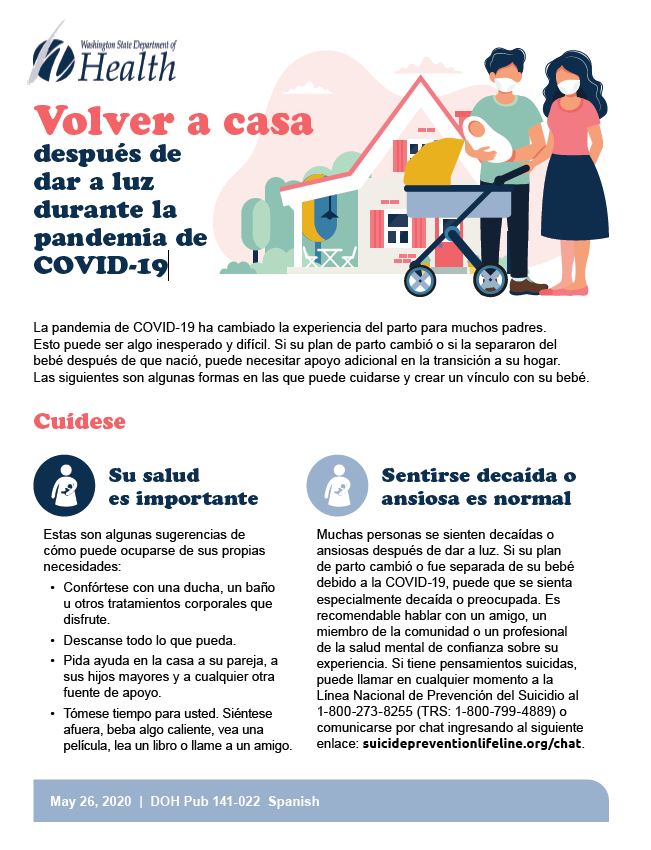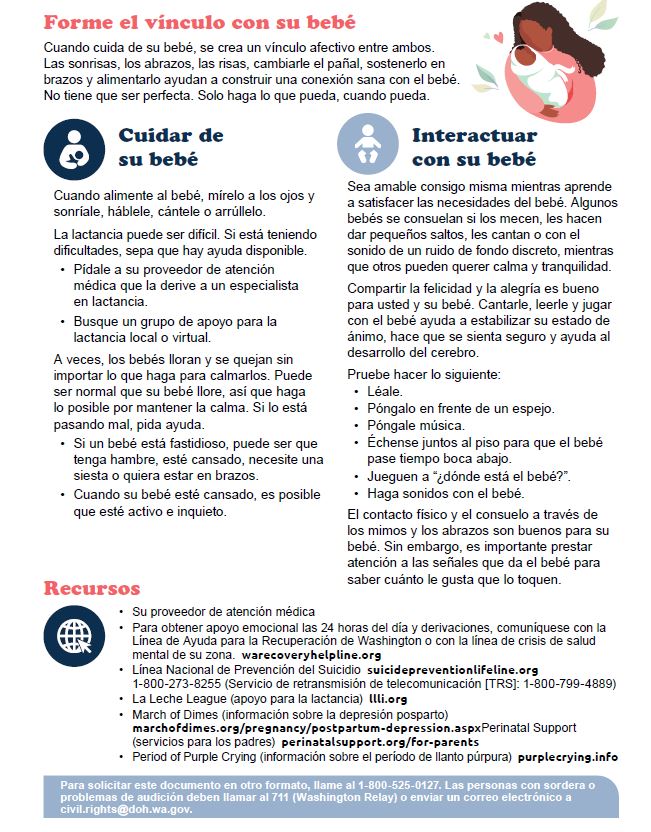|
For immediate release: July 28, 2020 (20-135) Contact: Jamie Nixon, Communications, 360-789-3804 The Department of Health launches CORONA Survey OLYMPIA – The Washington State Department of Health (DOH) launched the Community Recovery-Oriented Needs Assessment, or the CORONA survey. The survey is an effort to assess the behavioral, economic, social, and emotional impacts and the needs of communities across the state as a result of the COVID-19 outbreak. The CORONA survey results will inform immediate, long-term, and ongoing actions that DOH and local health jurisdictions can take to address the impacts of the COVID-19 outbreak on Washingtonians. In order to appropriately and equitably inform recovery plans at the state and local levels, DOH is requesting residents from across Washington to go to www.wacoronasurvey.com to take part in the survey. (To take the survey by phone, call 855-530-5787—interpreters are available to assist.) The survey is voluntary and confidential. At the end of the survey, participants will be given the option to provide their name, phone number and/or email address. Each week of the survey, three participants will receive a $100 Amazon.com gift code as a thank you for their time and participation. If you have additional questions about the CORONA Survey, you can call the Washington State Department of Health at 1-800-525-0127. Learn more about reopening and the statewide response to COVID-19 at coronavirus.wa.gov. Individuals can also find COVID-19 information on the Department of Health’s website or call 1-800-525-0127. Individuals can text the word “coronavirus” to 211-211 to receive information and updates on their phone wherever they are. The Department of Health works with others to protect and improve the health of all people in Washington State. Visit the DOH Newsroom for all news releases. Subscribe to get news releases in Spanish. You will continue to receive the English version. Washington State Department of Health is your source for a healthy dose of information. To request this document in another format, call 1-800-525-0127. Deaf or hard of hearing customers, please call 711 (Washington Relay) or email [email protected] Manage Subscriptions | Unsubscribe | Help
0 Comments
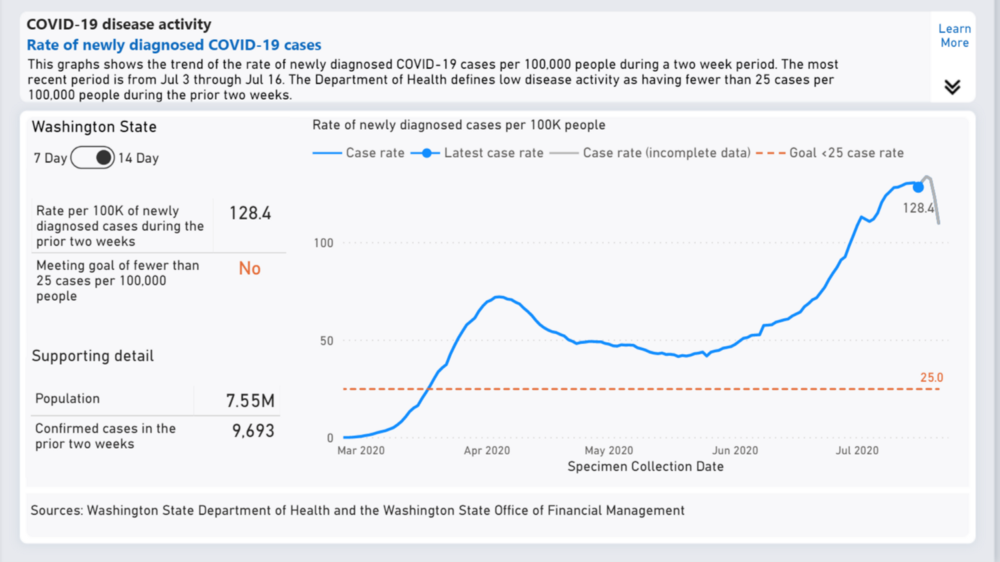 Remember how we flattened the curve? Washington State Department of Health Jul 24 · 3 min read The curve’s not flat anymore. This is an image from the risk assessment dashboards on www.coronavirus.wa.gov. Through June and July, the number of people diagnosed with COVID-19 in the previous two weeks per 100,000 population steeply increased. The number of people who have been tested has also increased, but the percent of people who test positive hasn’t drastically decreased. This is one way we can tell that the increase in the number of people with COVID-19 is due to increases in the spread of the disease in our communities and not just increases in testing. We’re all tired of this. But, we’re losing the momentum we had when we first started responding to COVID-19 in our communities. And this means more restrictions on businesses and gatherings with our friends and family. Today, the governor and secretary of health announced several updates to the Safe Start plan to help us have fewer, shorter and safer interactions with people outside our households. This includes reductions in the number of people who can be in a restaurant or fitness center at one time, and restrictions around other opportunities for gathering with other people for longer periods of time. This is a critical time when we all need to work together to prevent runaway growth in the number of people with COVID-19. We know how to do this — check out that chart again — we successfully reduced the spread of COVID-19 in April and May! The sooner we can get control of this virus again, the sooner we can open our communities, our businesses, and our schools. The most important thing you can do is reduce the amount of time you are around people outside your household. You can do that by having fewer, shorter, and safer interactions with other people. It’s still most effective for us to all stay home as much as possible. If you do go out, be sure to keep it quick, keep your distance from others, and wear your cloth face covering. Then wash your hands as soon as you get home. Practice compassion. This is a hard time for many of us. Washington Listens helps people manage stress and anxiety they may be experiencing because of COVID-19. If you or anyone you know is having difficulties managing stress, call the Washington Listens support line at 1–833–681–0211. Hours are from 9 a.m. to 9 p.m. Monday through Friday, and 9 a.m. to 6 p.m. Saturdays and Sundays. TTY and language access services are available by using 7–1–1 or their preferred method. Resources and self-help tips are available on walistens.org. More information. Stay tuned to our blog for more information on how you can help stop the spread of COVID-19. Sign up to be notified whenever we post new articles. Information in this blog changes rapidly. Check the state’s COVID-19 website for up-to-date and reliable info at coronavirus.wa.gov. Answers to your questions or concerns about COVID-19 in Washington state may be found at our website. You can also contact our the Department of Health call center at 1–800–525–0127 and press # from 6 a.m. to 10 p.m. Monday — Friday, and 8 a.m. to 6 p.m. Saturday — Sunday. Language assistance is available. Please note that this call center cannot access COVID-19 testing results. For testing inquiries or results, please contact your health care provider. Public Health Connection From the Washington State Department of Health Washington State Department of Health Protecting and improving the health of people in Washington State. Public Health Connection From the Washington State Department of Health New CDC report emphasizes COVID-19 can cause prolonged illness, including in younger people.7/27/2020 Washington State launched the Washington Listen program to support people affected by the stress of COVID-19 - this program includes a phone line to speak with support specialists and connect to community resources.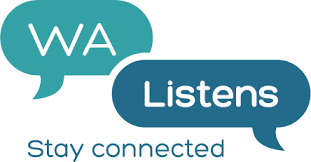 July 6, 2020 OLYMPIA - In response to COVID-19, Washington has launched Washington Listens, a support program and phone line to help people manage elevated levels of stress due to the pandemic. People who call the Washington Listens support line will speak with a support specialist and get connected to community resources in their area. The program is anonymous. "Washington Listens helps people cope and strengthen their resiliency in these uncertain times," said Sue Birch, director of the Washington State Health Care Authority, the agency managing the program. "It complements the state's behavioral health response services by providing an outlet for people who are not in crisis but need an outlet to manage stress." "This pandemic has had far-reaching effects that extend beyond our physical health. We are still in this fight against the virus, and the assistance will help Washingtonians recover during this uniquely stressful time," said Mike O'Haire, FEMA Region 10 administrator. The Washington Listens support line is 1-833-681-0211. It is available from 9am - 9pm, Monday - Friday, and 9am - 6pm, Saturdays and Sundays. TTY and language access services are available by using 7-1-1 or their preferred method. Providers and tribes that have partnered with Washington Listens include:
The Washington Listens support line is made available by a $2.2 million Crisis Counseling Assistance and Training Program (CPP) grant funded by Federal Emergency Management Agency (FEMA) and supported by the Substance Abuse and Mental Health Services Administration (SAMHSA). This program support short-term interventions to mitigate stress, promote the use or development of coping strategies, and provide emotional support to help Washingtonians understand and process their stress. Read more about Washington Listens below. How does Washington Listens function?Anyone in the state can call into the line to receive anonymous support. No personal information is kept by crisis counselors. The caller will have the option to select a language preference to accessibility options, or be routed to a live person for assistance. If the person in crisis needs behavioral health support, the counselor will work to get the person connected to behavioral health crisis services. In order to reach to our most vulnerable populations, crisis counselors will reach out to community and spiritual leaders to check in on people. StaffingAll positions require a high school diploma and do not require clinical education or experience, however staff will receive core content and basic training that cover skills needed to provide support to individuals during the COVID-19 pandemic. The following is a list of providers and tribes who will be starting up a team:
Resources and self-help tips are available on walistens.org. |
|
